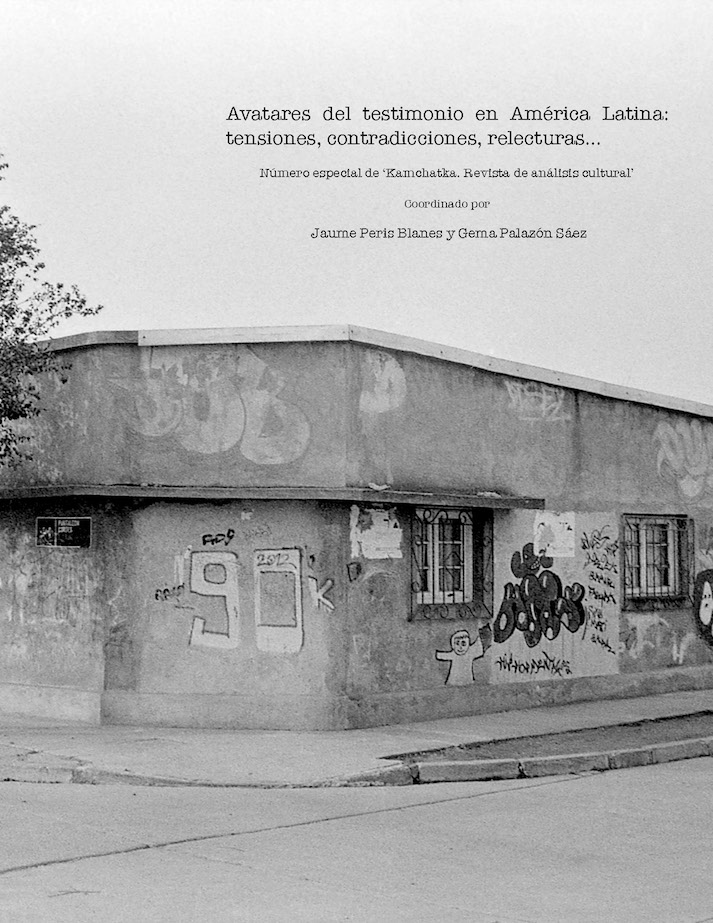“Una suma de negaciones”: Apuntes sobre el género testimonial y el Premio Casa de las Américas (1970-1976)
DOI:
https://doi.org/10.7203/KAM.6.7077Keywords:
testimonio, literatura testimonial, América Latina, memoria, Casa de las Américas, Cuba Abstract
Abstract
Resumen:
En este artículo se examinan los años de institucionalización del género testimonio por medio de un análisis de dos de las obras premiadas por Casa de las Américas en su premio literario anual en la categoría ‘testimonio’ entre 1970-1976. El objetivo es abordar la conceptualización estético-política del género testimonio establecida e institucionalizada por medio del premio y asimismo ver cómo se articulan las relaciones entre poética y política en las obras mismas. Partiendo de la hipótesis que las modalidades y el grado de intervención discursiva del escritor-editor condiciona la literariedad de esta categoría de relatos, el análisis en particular abordará la presencia autorial con el fin de aproximarse a las relaciones entre estética y política en el género testimonial.
Palabras clave: Testimonio, Revolución, Casa de las Américas, Género, Política, Poética.
Abstract:
This article examines the years of institutionalization of the testimonial genre through an analysis of two of the winning works of Casa de las América’s annual literary prize in the category ‘testimony’ between 1970-1976. The aim is to address the political and aesthetic conceptualization of t h e t e s t i m o n i a l g e n r e , e s t a b l i s h e d a n d institutionalized by means of the award. The study also seeks to analyse how the relationship between poetic and politics is articulated in the awardwinning works. Assuming that the modalities and the degree of discursive intervention of the writer-editor conditions the literariness of this category of stories, the analysis in particular addresses the authorial presence in order to approach the tensions between aesthetics and politics in the testimonial genre.
Key words:Testimony, Revolution, Casa de las Américas, Genre, Politics, Poetics
 Downloads
Downloads
 References
References
Bibliografía primaria: Actas del Premio Casa de las Américas. (1970-1975). de Izcue, N. (1973). Runan Caycu. Documental. Gilio, M. E. (1970). La guerrilla tupamara. La Habana: Casa de las Américas. Huillca, S., & Neira Samanez, H. (1974). Huillca, habla un campesino peruano. La Habana: Casa de las Américas. Bibliografía secundaria: Aguilar, J. Z. “From representation to self-representation: life stories, testimonios, and autoethnographies in Spanish America”. Latin American Indian Literatures Journal, 20(1) (2004): 18-27. Altuna, E. “La partida inconclusa: indigenismo y testimonio”. Revista de Crítica Literaria Latinoamericana, 34(68)(2008): 121-141. Alva Mendo, J. (2003). “El testimonio oral en los andes centrales. Travesías y rumor”. En G. Espino Relucé (Ed.)Tradición oral, culturas peruanas. Una invitación al debate.Lima: Fondo Editorial de la UNMSM y Facultad de Letras y Ciencias Humanas: 63-90. Barnet, M. (1983). La fuente viva. La Habana: Ed. Letras Cubanas. Caballero, J. D. (1996). “Para una lectura del etno-testimonio peruano de los años setenta”. En J. A. Mazzotti & U. J. Zevallos Aguilar (Eds.), Asedios a la heterogeneidad cultural: libro de homenaje a Antonio Cornejo Polar. Philadelphia: Asociación Internacional de Peruanistas: 339-363. Echevarría, R. G. (2001). La voz de los maestros: escritura y autoridad en la literatura latinoamericana moderna. Madrid: Verbum Editorial. Emery, A. F. (1996). The anthropological imagination in Latin American literature. Columbia: Univ. of Missouri Press. Forné, A. (2010). “Literatura y testimonio en “Punto estrella””. Lofquist Eva & Victoria Thornryd (eds) Caminos de lectura. Antología de textos y aproximaciones analíticas al texto literario. Lund:Studentlitteratur: 86-101. Forné, A. (2013). “La Historia en la narrativa hispanoamericana contemporánea”. Castro Andrea & Eduardo Jiménez Tornatore(eds.) Historia de las literaturas hispánicas: aproximaciones críticas Lund: Studentlitteratur: 257-76. Forné, A. “El género testimonial revisitado. El premio testimonio de Casa de las Américas (1970-2007)”. El taco en la brea 1 (1) (2014): 216-32. Fornet, A. (2001). La coartada perpetua. México, D.F.; Buenos Aires: Siglo Veintiuno Editores. Fornet, A. “El Quinquenio Gris. Revisitando el término”. Criterios. Ciclo «La política cultural del período revolucionario: Memoria y reflexión». (2007). Recuperado a partir de www.criterios.es/cicloquinqueniogris.htm Foster, D. W. (Ed.). (2015). Handbook of Latin American Literature (Routledge Revivals). Routledge. García, V. “Testimonio literario latinoamericano: prefiguraciones históricas del género en el discurso revolucionario de los años sesenta”. Acta Poética 35 (1), (2014).: 63-92. Gilman, C. (2012). Entre la pluma y el fusil: debates y dilemas del escritor revolucionario en América Latina. Buenos Aires: Siglo XXI Editores. Grillo Arbulú, M. T. (2013). Rutas textuales de la exclusión : raza y etnicidad en textos de enunciación andina del Perú colonial y republicano.Tesis doctorial. University of British Columbia. Recuperado a partir de http://oatd.org/oatd/record?record=handle%5C%3A2429%5C%2F45330 Huaytán Martínez, E. “Indigenismo, antropología y testimonio en el Perú. Rupturas, ampliaciones y plataformas de representación”. Revista de Crítica Literaria Latinoamericana, Año XL(80), (2014): 309-323. Ochando Aymerich, C. (1995). “Hacia la institucionalización del testimonio”. Paepe Christian (ed.) Literatura y poder: actas del coloquio internacional. Louvaina: Leuven University Press: 163-70. Ochando Aymerich, C. (1998). La memoria en el espejo: aproximación a la escritura testimonial. Barcelona: Anthropos Editorial.
Downloads
Published
How to Cite
-
Abstract1264
-
Artículo (Español)729
Issue
Section
License
This journal provides an immediate free access to the content on the principle that freely make investigation available to the public, which promotes an increased global knowledge exchange.
Unless otherwise indicated, texts published in this journal are under the license Attribution-NonComercial 4.0 by Creative Commons. These texts may be copied, distributed and publicly communicated whenever the publication’s author and title are quoted and whenever they are not used for commercial purposes. In any case, intellectual property of the articles and its potential economic rights entirely belong to its authors.
The full license can be consulted on https://creativecommons.org/licenses/by-nc/4.0/. We encourage authors to disseminate papers published in Kamchatka. Journal of cultural analysis electronically, in institutional digital repository or in their websites.





